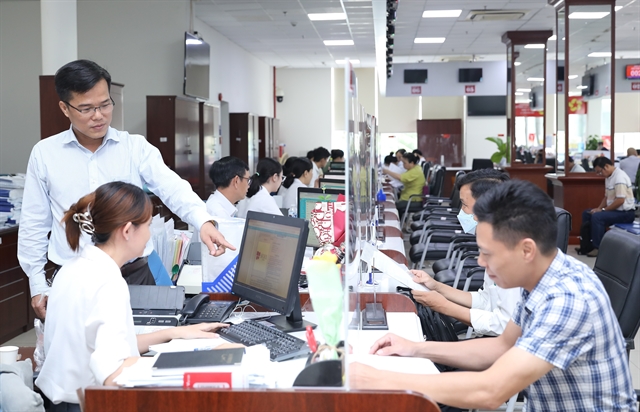 Society
Society

 |
| Public officers at the Public Administrative Service Centre of Tây Ninh Province. — VNA/VNS Photo Thành Phương |
HÀ NỘI — Digital transformation is a vital factor for the effective operations of the two-tier local government model, according to a discussion between officials and experts at a virtual seminar hosted by Việt Nam Government Portal and the Office of Hà Nội People’s Committee on Thursday.
The two-tier local government model, consisting of city/provincial-level and commune-level administrative units, took effect nationwide on July 1.
Speaking at the seminar, Phan Trung Tấn, director of the Department of Local Government (under the Ministry of Home Affairs) said that although it has only been 23 days since the new model came into operation, the initial results have been very positive.
At the commune level, efforts have been made to comprehensively consolidate the political system and ensure uninterrupted operations.
In particular, specialised agencies such as public service centres have been established to handle administrative procedures for citizens and businesses at the grassroots level.
Local public service delivery systems have been linked to the National Public Service Portal to facilitate processing.
Recognising digital infrastructure as a crucial factor to ensure smooth administrative procedures and effective local governance, the Ministry of Science and Technology (MoST) on April 7 issued guidance to all localities, which outlined the necessary steps and processes to upgrade local information and management systems.
Following a pilot system upgrade in HCM City, the MoST issued additional guidelines and held digital training for local authorities in support of the two-tier government.
The ministry has also provided advice to Deputy Prime Minister Nguyễn Chí Dũng, worked with ministries and departments, and coordinated tech firms to assist public officers in operating and maintaining the administrative systems.
Deputy Minister of Science and Technology Phạm Đức Long said that more than 12,000 personnel from digital technology enterprises are working alongside 3,219 communes to support the transition process following the nationwide restructuring. More support has also come from public security forces, the military, and student volunteers.
 |
| Local officials and technology experts at the virtual seminar held by Việt Nam Government Portal and the Office of Hà Nội People’s Committee on Thursday. — Photo courtesy of the Government Portal |
Meanwhile, the capital city of Hà Nội has focused on synchronisation, data and proactiveness in its digital transformation process.
Since the Politburo issued Resolution No 57 on making breakthroughs in science, technology, innovation and digital transformation in the country in late 2024, Hà Nội has issued a series of action programmes from the municipal to the grassroots levels.
The city authorities considered the document significant not only in terms of digital transformation, but also in improving the urban governance model, said Trương Việt Dũng, deputy chairman of Hà Nội People’s Committee.
With the principle of ‘leaving no one behind,’ Hà Nội’s government paid special attention to underprivileged groups in the process of administrative service delivery.
Initiatives to assist residents in their homes have been launched to provide administrative support, reducing the travel burdens for vulnerable individuals.
“The greatest lesson for Hà Nội is that resources come from mindset, motivation comes from innovation, and strength comes from the people,” said Dũng as he emphasised the necessity of transforming both thinking and practice.
Speaking on local governance experience, Cửa Nam Ward People’s Committee’s deputy chairwoman Trịnh Ngọc Trâm said new initiatives will inevitably encounter both advantages and challenges during initial implementation.
Civil servants undoubtedly face more pressure as the workload at the ward level has greatly increased following the administrative restructuring, she said, and therefore, grassroots leaders and officers have had to work closely with their teams to address difficulties and ensure that tasks are carried out effectively.
“We believe that although there are challenges, with the trust of the people and the support and companionship of the higher levels, local officials can fulfil their responsibilities,” said Trâm.
Speaking at the seminar, Nguyễn Quang Đồng, director of the Institute for Policy Studies and Media Development (IPS, under the Việt Nam Digital Communication Association) added that more attention should be given to data security in the current context.
“In addition to traditional technical measures for data protection such as defending against cyberattacks and complying with technical standards, we recommend adopting a broader, more comprehensive policy approach to data-related issues,” he said, explaining that these could include policies on data classification and privacy protection.
“With unified awareness and tailored policies for each agency and unit, as well as greater public understanding, we can be confident that data will indeed become vital to governance and institutional systems,” said Đồng. — VNS




